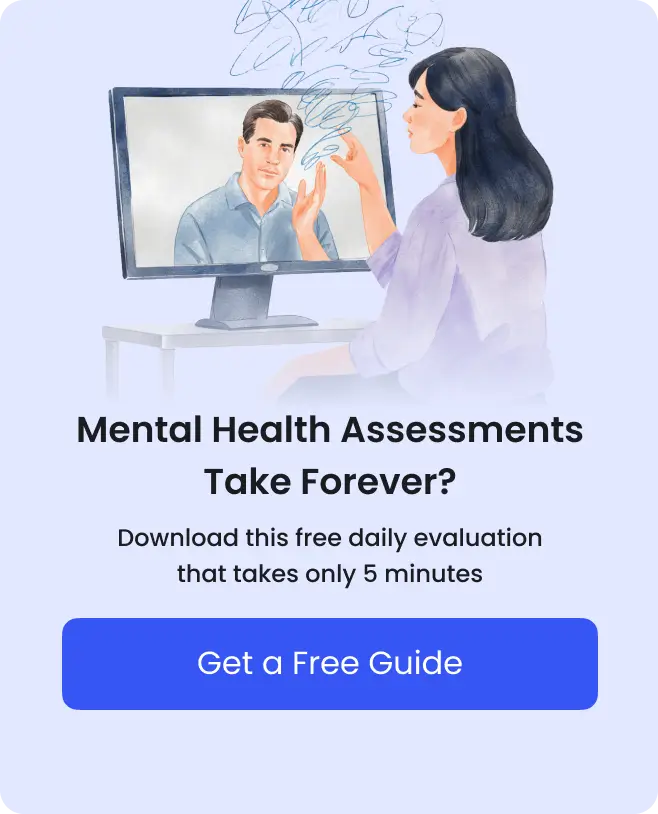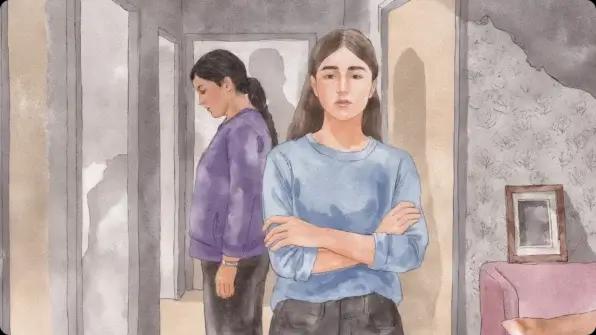The term “daddy issues” is a common description of a complex emotional experience and unresolved emotional conflicts that are rooted in the relationships with a father or another significant male caregiver in a daughter’s or son’s life.
Can your father’s presence (or absence) continue to affect your feelings, insecurities, and even the people you choose to date today? Take a 5-minute ultimate daddy issues test to find out.
If you want to get insights about how your father influenced your current self, take a free childhood trauma assessment from Breeze.
Take “daddy issues” test
Please answer honestly and choose only one option for each question in this quiz. There are no wrong or right answers. Once you finish the test, calculate the total points.
1. How do you feel about your relationship with your father?
- We have an emotional connection, and I can always ask him for help. (1 point)
- I remember some heartwarming moments. However, I would be happy to get more love and support from my dad than I did. (2 points)
- I have a long list of grievances with him, and we have unresolved problems. (3 points)
2. How often do you look for others’ approval?
- I’m confident when charting my course and am sure of my decisions. (1 point)
- Sometimes, I look for reassurance, especially when I’m not confident in my actions. Still, it rarely affects my decisions. (2 points)
- It often serves as a mirror, reflecting my self-worth, confidence, and satisfaction. (3 points)
3. What can you say about your romantic relationships?
- Most often, they’re fulfilling and positive. I may have small arguments with my partners, but we handle challenges together. (1 point)
- My relationships are healthy but require effort to maintain. We often struggle with communication. (2 points)
- Most of my relationships are hard for me. (3 points)
4. How do you set boundaries in relationships?
- My boundaries are pretty secure; it’s important for me to keep relationships respectful. (1 point)
- I set some boundaries, but they’re a bit wobbly. Sometimes, I would let them slide and then feel guilty about it. (2 points)
- I’m too afraid that people will leave me if I have clear boundaries. (3 points)
5. How would you describe your love language?
- Care and understanding, quality time, and physical touch. I show love in whatever way feels right at the moment. (1 point)
- It’s tough to show love directly, so I often give gifts or material things to express my feelings. (2 points)
- Expressing love for me is quite challenging. (3 points)
6. How do you feel about vulnerability in relationships?
- I’m fine with being vulnerable. It helps me connect honestly with others. (1 point)
- I don’t open up to everyone around me. But if I can trust someone, it feels right to share my feelings. (2 points)
- I struggle with vulnerability and find it challenging to lower my defenses. I am okay with my self-sufficiency (3 points)
7. How do you feel after arguing with your partner?
- Well, I’m a bit frustrated. Still, I’m sure we’ll discuss and resolve the problem together. (1 point)
- I’m feeling anxious and distant. I hope we can work through this, but I’m worried it might stem from deeper issues. (2 points)
- What if they leave me tomorrow? I need to do everything to fix the situation before it’s too late! (3 points)
8. Do you frequently compare your achievements to those of others?
- No, I’m happy for others’ success, but my way of life differs. (1 point)
- It can happen occasionally when I feel low, but it doesn’t overshadow my progress. (2 points)
- Often. Why are others so successful while I feel like I’m always falling short? (3 points)
9. How do you feel when your partner needs to go to another city for several days?
- It’s a great way for both of us to get some space. (1 point)
- I feel relieved that I’ll have some time alone. It’s easier for me to relax without worrying about our relationship. (2 points)
- I’m depressed and anxious that they’ll find someone better and break up with me. (3 points)
10. How do you react when you feel left out?
- I know not everything revolves around me, and it’s just part of life occasionally. (1 point)
- It’s a bit painful, but I can usually bounce back and find a way to feel better. (2 points)
- I feel deeply hurt, with a feeling like I don’t deserve respect or anything. (3 points)
Daddy issues test results
Disclaimer: This test is designed for self-reflection and is not a substitute for professional help.
10-16 points
You are unlikely to live with daddy issues.
Still questioning something like, “Do I have daddy issues?” “No” is the most likely response. You appear to have had a happy, healthy childhood, even though your connection with your dad was not always smooth. Whatever your childhood memories are, your dad cared enough that you feel secure in your love life and confident in yourself.
17-24 points
Your answer to the daddy issues test suggests that you show some signs of unresolved conflicts or a complicated relationship with your dad.
Based on your answers, you might have seen a loving and supportive dad a few times in childhood, and you still keep these memories in your heart as real treasures.
Maybe he was detached or inconsistent rarely, but there were still moments of care. This emotional baggage of mixed experiences might have left you with some lingering feelings or needs that can affect your relationships and emotions today.
“My father wasn’t perfect, but I did forgive him. We still talk, and I want to improve our relationship.” We asked Viviana Greco, PhD, if the relationship becomes better now, whether it will be helpful to cope with daddy issues from childhood, “It’s great that you’re working on improving your relationship with your father and that forgiveness has been part of your journey. While building a stronger relationship now can bring emotional healing and closure, deeper issues and feelings from the past can still influence you in ways that aren’t easy to resolve alone. A therapist can help guide you through unresolved feelings from childhood.”
25-30 points
You are likely experiencing some “ultimate daddy issues.”
According to your answers in this daddy issue test, your relationship with your father has long-lasting effects. Have you ever asked yourself, “Why do I hate my dad?”
Your lost inner child might have experienced a lack of support and help in childhood, so now you’re probably looking for a father figure in someone else. You might find yourself drawn to older partners, craving any bit of affection, and feeling lonely even when you’re with others. These echo your unresolved feelings, and the daddy issue quiz shows how much they influence your well-being, reactive abuse, and emotional regulation.
How to know if you have daddy issues?
What are the signs that she has problems with a father figure? And what manifestations of ultimate daddy issues can you notice in your behavior? Here’s a short list.
- Trusting people, especially men, feels like a big challenge
- You seek constant validation to feel secure in relationships
- You’re fear of being left behind
- Setting boundaries is hard — you tend to overgive.
- You have anxiety or insecurity, always worrying if your partner will leave
- Jealousy and possessiveness in your love life
- Expressing your emotions doesn’t come easy, or sometimes you are irritated easily, even on the smallest things
- You need your father’s approval
- You often question your worth
- You’re mainly dating older men

Daddy issues explained: How a missing father affects your adult life
Do you find yourself seeking approval, drawn to an emotionally unavailable person, or dealing with trust issues? These patterns might repeat because your relationship with your parents, especially your dad, still plays a role.
A significant number of individuals are raised in households where their fathers are either physically or psychologically absent. For example, 2022 data indicate that one in four children has no father in the household, as per the U.S. Department of Justice. [1]
The exact origin of the phrase “daddy issues” is unknown, but it is thought to have come from Sigmund Freud’s idea of the “Father Complex.” More frequently, it is linked to women who have challenging relationships with their fathers.
Nevertheless, this experience has the potential to impact anyone who has a troubled childhood due to a lack of a father figure, biological father, or other male caregiver. This is similar to an experience with other paternal figures, so-called “mommy issues.”
This issue was the subject of a study published by Sara McLanahan, Laura Tach, and Daniel Schneider. As the authors point out, social and emotional skills are important for adult outcomes like going to college, starting a family, and being successful in the job market and the labor force. [2]
Another study indicates that people with daddy issues are more likely to have depression later in life. [3]
Additionally, as Dr. Mark Borg Jr., PhD, author of “How We Use Dysfunctional Relationships to Hide From Intimacy,” states, fatherless children often attempt to compensate for the absence of the primary caregiver in their lives.
What should you do if this happens and the daddy issues test indicates a high likelihood of it? It’s time to take care of your mental well-being.
How to get over daddy issues
Here are some tips from Viviana Greco, PhD, on how to take care of yourself if your relationship with your father is still impacting your life:
- Discover yourself with the Breeze app, which allows you to learn more about your behavior patterns and personality. For instance, take more quizzes about your attachment style, emotional intelligence, and childhood trauma, and gain valuable insights that will help you know yourself better.
- Build self-compassion and empathy by treating yourself with the same kindness and understanding you would offer a friend
- Surround yourself with supportive and nurturing relationships
- Seek support in groups or communities that have a similar experience to yours
- Engage in activities that make you feel competent and fulfilled, such as hobbies, fitness, or learning something new
- Practice mindfulness or journaling, for example, in the Breeze app
If you can’t handle conflicts or the outcomes of past wounds on your own, seeking professional advice from a licensed therapist is the best option.
Sources:
- U.S. Census Bureau. (2023). Living arrangements of children under 18 years old: 1960 to present. Washington, D.C.: U.S. Census Bureau.
- McLanahan, S., Tach, L., & Schneider, D. (2013). The Causal Effects of Father Absence. Annual review of sociology.
- Culpin, I., Heuvelman, H., Rai, D., Pearson, R. M., Joinson, C., Heron, J., Evans, J., & Kwong, A. S. F. (2022). Father absence and trajectories of offspring mental health across adolescence and young adulthood: Findings from a UK-birth cohort. Journal of affective disorders.
Disclaimer
This article is for general informative and self-discovery purposes only. It should not replace expert guidance from professionals.
Any action you take in response to the information in this article, whether directly or indirectly, is solely your responsibility and is done at your own risk. Breeze content team and its mental health experts disclaim any liability, loss, or risk, personal, professional, or otherwise, which may result from the use and/or application of any content.
Always consult your doctor or other certified health practitioner with any medical questions or concerns
Breeze articles exclusively cite trusted sources, such as academic research institutions and medical associations, including research and studies from PubMed, ResearchGate, or similar databases. Examine our subject-matter editors and editorial process to see how we verify facts and maintain the accuracy, reliability, and trustworthiness of our material.
Was this article helpful?







